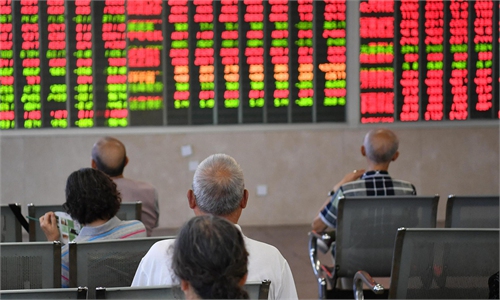WeChat, Douyin, Sina Weibo, Kuaishou to start rectification of financial self-media accounts

WeChat TikTok Photo:VCG
Leading Chinese social media platforms WeChat, Douyin, Kuaishou and Sina Weibo said on Saturday they will start rectification of irregular practices involving publishing financial information on their platforms, in response to Chinese cyberspace regulator's latest crackdown on violations of financial self-media accounts.
According to a statement issued by WeChat on Saturday, in accordance with requirements of the Cyberspace Administration of China (CAC) to create a clean internet environment, WeChat will instantly close financial self-media accounts that are found to be involved in badmouthing financial market, and blackmailing and spreading rumors that lead to strong public anger. The rectification process will last until October 26.
Douyin, Kuaishou and Sina Weibo also announced a similar process starting from Saturday, targeting financial self-media accounts' violations like publishing irregular business information, distorting economic policy, badmouthing financial markets, and spreading rumors and blackmailing.
Sina Weibo said it will severely punish those accounts in violation of relevant rules and keep the public updated on the process in a timely manner as it will actively guide the construction of a healthy and orderly internet environment.
The four platforms' announcements came on the heels of the news on Friday that China's top cyberspace regulator will rectify irregularities of financial self-media accounts.
The move marks the continuous improvement in the regulatory framework when it comes to the irregular practices by financial self-media, Dong Dengxin, director of the Finance and Securities Institute of Wuhan University, told the Global Times on Saturday.
In the past, the China Securities Regulatory Commission sometimes issued alerts warning investors of the illegal securities activities proposed by some financial self-media accounts, which may pose extremely high risks.
By comparison, the CAC apparently has greater enforcement power over those financial self-media that are used to spreading fear without restraint so as to seek eyeballs, Dong noted.
The development of the social media platforms has blurred the lines between grassroots and experts, but the blind pursuit for online traffic must be curbed when it comes to publishing and interpreting financial news, because investor sentiment is an important factor affecting market performance, Dong said.
For instance, Chinese regulators have introduced a series of measures to crack down on monopolistic behaviors and unfair competition throughout the internet sector. The purpose is to tackle problematic issues in some internet giants, such as monopolistic behaviors and cybersecurity risks, laying the foundation for high-quality development in the future.
Yet, some self-media accounts misinterpreted the trend and spread pessimistic views to seek eyeballs, causing certain negative impact on the investor sentiment and weighing down the stock market.
Under the regulatory requirements, self-media accounts that distort China's financial policy and macroeconomic data, badmouth China's financial market and economy, spread rumored "insider information," maliciously hype up speculation in stock and housing market, and publish financial columns using fake identities of government insiders or scholars will be punished.
The latest crackdown on irregular financial media accounts is part of a campaign by the Chinese cyberspace regulator to maintain a clean internet environment so as to address major issues of public concerns related to online violations. The campaign also covers illegal activities in cultural and entertainment sectors, with enhanced rectification measures released targeting the sick parts of "fan circle" culture.
Global Times

